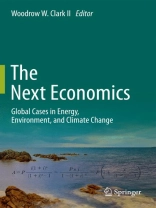The Next Economics focuses on how the field of economics must change and incorporate environment, energy, health and new technologies that are called externalities for stopping and reversing climate change. The field of economics needs to become a science. Economics in this book for the Green Industrial Revolution which goes beyond the third industrial revolution since it covers cases, examples and specific economic analyses that both scientific and global. The book concerns climate change and how the Economics for Externalities, needs to range from energy and national security to infrastructure and communities. Solutions and cases of the “Next Economics” are based in western philosophical economic paradigms and how that is changing due to the significance of current global economic and societal concerns. Finally practical applications for economics are explored using global environmental and energy issues. Areas that need a fresh look at and be integrated with economics, include the environment, social and political issues, energy, health climate change and their infrastructures, as they are major components of the macroeconomics for the future. Based on past economic models, these subjects have been lost or ill fitted into modern economic theory. The challenge is to explore and to look deeply into economics in order to provide it a new direction with the possibility for understanding, changing and saving the planet from climate change. This book presents to economists and policy-makers alike areas of environmental economics, energy policy, health and social issues which are needed to stop and reverse climate change.
Innehållsförteckning
1. Market Solutions for Climate Change.- 2. Energy Security in the Asia-Pacific Region.- 3. Asia’s Role in the Global Economic Architecture.- 4. Energy Economics in China’s Policy-Making Plan.- 5. The Economics of The Green Industrial Revolution.- 6. The Logic of Qualitative Business Economics – A perspective on Science.- 7. Energy Planning for Regional.- 8. Transformation and Opportunity: California’s Economic Gains through Environmental Goals.-9. Economic-environmental performance of micro-wind turbine in Mediterranean area.- 10. The “Cheap Energy Contract”: A Critical Roadblock to Effective Energy Policy in the USA.- 11. Financial Feasibility Analyses of Renewable Energy Projects.- 12. Conclusions: The Future is NOW.
Om författaren
Dr. Clark, a long-time advocate for the environment and renewable energy, is an internationally recognized author, lecturer, public speaker and advisor specializing in sustainable communities. Dr. Clark was one of the contributing scientists to the work of the United Nations Intergovernmental Panel on Climate Change (UNIPCC), which as an organization was awarded the Nobel Peace Prize in December 2007. His contribution was for work as the co-writer on Chapter 2 on Finance and Economics and the co-editor for Chapter 3 on Legal and Contracts. Currently, he is Academic Specialist, UCLA Provost Office and Cross-Disciplinary Scholars in Science and Technology.












